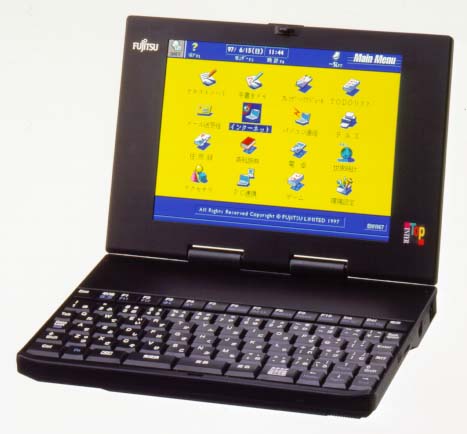DOS Palmtop: Fujitsu INTERTop model 10 Details and specs
Fujitsu INTERTop model 10

About this machine:
The Fujitsu INTERTop model 10 was released exclusively in Japan, just 5 months before its successor the model 20. So the quiz question is "So what's the difference between the model 10 and the model 20?". Actually the included CF card of the model 20 now has a whooping 12MB instead of just 6MB. Of these 6MB in the model 10 the user can actually use around 2MB, the rest is occupied by system files. A bit too large to be called a Palmtop, but still cute and interesting enough to make it to my list. Compared to the IBM PC110 it is not so impressive, especially if you consider that it came out 2 years later, has less Features and is considerably larger. Still this is a fun machine to play with since it Comes with MS-DOS 6.2 in ROM, can boot from PCMCIA (SRAM or ATA) and the Keyboard is quite nice to use. That the ROM contains DOS is neat, but without a CF the main menu won't load, just prompting you to insert the CF and there's not much to do without it. There was also a "Docomo" model which afaik only differed by the applications included and half size of the Flash memory. It has a touch screen and the Screen can be tilted 180 degrees so you effectively have a tablet. Since that way the keyboard is on the underside of the unit it is however a bit of a weird tablet that way. The "hard disk" is actually a 6MB CF Card which can easily be swapped, so that is actually a nice Feature. Weird Thing is that like the IBM PC110 you can use These Sony NP-F550 batteries. I guess the Japanese just loved that battery pack... Like with the model 20 there were 6 different editions available - 3 different colors (Silver, red, blue) and each either with JIS keyboard or the "Thumb shift" keyboard. The BIOS can be accessed by pressing F2 on startup and you can change the processor speed between 8,16 and 33 MHz. You can also edit the many boot options and such stuff, so that is neat. If the BIOS will always "forget" some settings then the BIOS battery is dead.
Specs:
CPU: AMD ELAN SC400-66AC @ 33MHz
Graphics: VGA
Display: 256 Color 7.2" DSTN LCD 640x480
Memory (RAM): 4 MB RAM
ROM (Software): 12 MB Compact Flash based SSD, leaving 3.5 MB for user data
I/O ports: RS232 Serial (Proprietary connector), 1 x PCMCIA Type II slot, 33.6Kbps fax modem, IRDA 1.0
Sound: PC Speaker
Operating System: MS-DOS 6.2 (Japanese)
Software: Loads of Japanese PIM software. Browser, email Client and more included
Size: 210 x 149.5 x 29 mm
Powered by: Rechargable li-ion battery (Sony NP-F550 compatible)or AC adaptor (included)
Weight: 750 gram including battery
Special features: Boots from PCMCIA, color screen, modem, Infrared, touchscreen, can be converted to tablet
Released: 12th of June 1997
Originally retailed for:: 128,000 Yen
Clone of: Not a clone
Similar models: Gateway 2000 handbook
Pros:
- Quite powerful
- Good Keyboard if the Japanese layout doesn't bother you
- Touchscreen
- HDD (CF Card) can easily be replaced
- Can use generic sony Camcorder battery clones
Cons:
- Battery life obviously shorter than some 8086 based palmtops
- Quite big
- Impossible to get outside of Japan
- No AA batteries
Collector Value:
8 of 10
Usage Value:
7 of 10
Verdict:
A bit of an oddball, it doesn't fit this list so well because it's a bit too big and doesn't use AA-Batteries. Still it's a cool vintage machine and since it boots from PCMCIA (SRAM or ATA) and the system drive CF-Card can be easily replaced there's loads of stuff to do with it. The Touchscreen and tablet conversion Feature are obviously rather pointless, would have been better if they included a mouse stick instead. Also just 1 PCMCIA Slot, but if you install a large CF Card with your favorite OS then you can use the PCMCIA for a wifi or Network Card. Ah yeah and it should have a Sound Card and a mouse stick, that would have been neat.
Back to the Palmtop PC index
